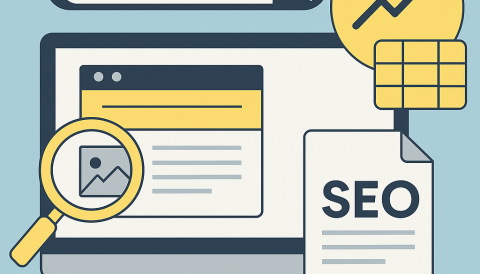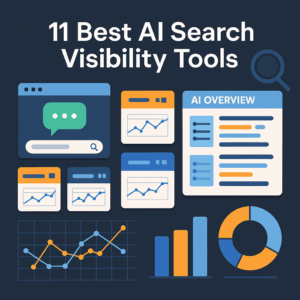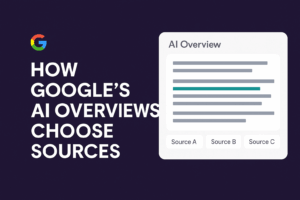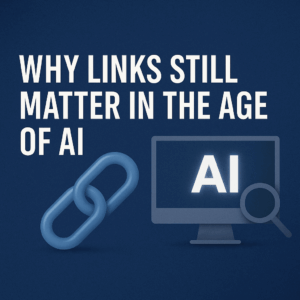Officially, blue links are not enough anymore to bring in traffic organically. With conversational models and Google AI Overviews, traditional SEO strategies are becoming obsolete quickly. A significant number of users are solely relying on these conversational models, meaning even the top-ranking content is invisible to a massive audience if not cited by AI models. The fact that most of the marketing experts are overlooking how AI search operates on a different paradigm, where ranking is just a part of a broader strategy. Tracking where & how your content appears in AI-generated responses manually is nearly impossible. Especially since citations vary even with the same prompt. Running thousands of pattern variations isn’t practical for most marketing teams due to time and resource constraints. Therefore, one needs AI search visibility tools to automate the mention tracking process, avoiding burnout from manual tracking. Before we dive deeper into these tools, let us understand why they are so crucial.
Why AI Search Visibility Tools are Important
With AI searches, people are getting answers without visiting any links. This Zero-click movement has made it crucial for website owners to appear in AI Overviews and other LLMs and remain visible to their target audience. AI search visibility tools are designed to monitor whether your content is getting cited by the AI. Not only this, but some AI search visibility tools offer strategic insight to help you create content that is more likely to earn those citations in future queries.
In other words, these AI search visibility tools are like Google Analytics for AI search. They provide website owners and SEO experts with insights into how their content performs in LLMs. Further, traditional SEO metrics like page views, rankings, and backlinks are not enough for users visiting LLM models. To truly understand and optimize your presence, it is essential to combine standard analytics and AI visibility.
Factors to Choose the Right AI Search Visibility Tool
- Tracking citations
Well-optimised content has more chances to show up in many AI platforms and Google AI Overviews as well. Making it important to search for which brand is getting citations. Look for the tools that actively monitor and alert you to brand mentions and citations across the top LLMs, such as ChatGPT, perplexity, and more.
- Traffic insights & suggestions
Improved AI visibility means higher traffic, but estimating a figure without the right tools is like throwing darts in the dark. Therefore, search for a tool that delivers tangible value and insights using historical patterns, and identify the key audience segments. Additionally, the tool should offer content recommendations, analysing what’s working and identifying the gaps to improve content structure, driving more AI citations.
- Trend Predictability
A tool allows you to stay ahead in AI search, offering an opportunity to analyse the emerging trends and help you adapt quickly. Therefore, the right tool should include AI prompts, monitor topic clusters, and set alerts when new formats start dominating, boosting your chances of earning citations faster.
- Competitor tracking
Understanding your position in the industry is just as important. Choose a tool that enables you to compare visibility against competitors across major AI platforms. The right tool should provide competitive benchmarks and uncover visibility gaps.
11 Best AI Search Visibility Tools
After we know why AI search visibility tools are so crucial and what factors determine which tool is a perfect fit for your organisation, let us look into the top 11 AI search visibility tools.
Profound
Rating: 4.5/5
Best for enterprises, marketing agencies, and brands with significant AI exposure.
Profound is an AI search visibility tool that is especially designed to satisfy the needs of enterprises requiring extensive detailing. It analyses the context around every brand mentioned, reading it from a sentiment point of view, drilling down into how the audience is perceiving the brand value. Further, this tool also lists down the competitors getting mentions alongside your brand, representing the authority with topical clusters as well.
Pros
- Extreme customisation available for the dashboard.
- Integrates seamlessly with existing systems.
- Creates extensive reports to align with the organisation’s workflow.
- Tracks and alerts you whenever your AI response drops.
Cons
- Higher cost
- Incomplete solutions
- Lack of strategic depth
- Still evolving in tracking visibility
SemRush
Rating:4.4/5
Best for: Digital marketing agencies, comprehensive SEO teams, and large enterprises
SemRush’s AI toolkit is an add-on feature that seamlessly integrates with the traditional SEO platform, providing advanced insights with its AI presence. This advanced feature not only tracks keywords but also focuses on sentiment, engagement, and overall visibility metrics as well. For instance, Semrush’s AI tool frequently mentions how your brand is described by AI.
Pros
- Advanced keyword research
- Internal detail competitive analysis
- Monitor SERPs with AI-generated results
- Expert insights with micro-level analytics
Cons
- Learning curve for new users
- The AI feature is not up to mark
- Expensive compared to others
Scrunch AI
Rating: 3.8/5
Best for: enterprises with a focus on influencer marketing and seeking AI-enhanced visibility
This AI search visibility tool combines influencer analytics by creating a unique report to witness how your social media partners are performing. Further, it also allows one to measure the ROI of influencer marketing.
Pros
- Connects AI search visibility with social performance
- Integrates strongly with social media
Cons
- Doesn’t suit traditional B2B companies
- Smaller platform coverage
Nightwatch
Rating: 4.3/5
Best for: Global businesses, conglomerates, and multi-location companies.
Nightwatch has solved the complex challenge of tracking AI search visibility across multiple locations and languages. It analyses the semantic understanding of how AI interprets your brand vision in its own terms.
Pros
- Designed specifically for multi-region tracking and predictability
- Accurate real-time data updates
- Reliable international data
- Global campaign management seamlessly
Cons
- Too much for a single region
- Complex
- Expensive
- Learning curve
Otterly.ai
Rating: 4.2/5
Best for: Smaller teams, mid-size businesses, and small agencies.
Otterly.ai accesses AI search visibility throughout the ecosystem in one click. It tracks and monitors Google AI overviews, ChatGPT, and Perplexity seamlessly with a user-friendly interface. Moreover, it goes in-depth with prompt-level tracking, brand ranking analysis, sentiment analysis, and link tracking.
Pros
- Extensive reports in exportable formats
- Geographic performance tracking is available
- Affordable
- User-friendly
- Free trial without a credit card
Cons
- Limited advanced features
- Not eligible for enterprise-level reporting
- Costly to scale
BlueFish AI
Rating: 4.0/5
Best for: businesses looking for deep user behaviour analysis.
Bluefish AI focuses on learning and predicting user search behaviour, providing insights, and optimising for better visibility. It provides value to understand the psychology behind the AI search visibility and answer why other brands appear more often.
Pros:
- Unique insights into search patterns
- Strategic optimization
- Focus on understanding “why” behind AI recommendations
- Cross-platform visibility
Cons:
- Complex data requires expertise
- Higher learning curves
- Data-focused rather than actionable insights
Ahrefs
Ahrefs has built its strong foundation with backlink analysis and competitive research. Now it’s moving into AI search visibility as well, adding an updated layer of a powerful platform that tracks citations, provides advanced filters, and monitors changes over time. The best feature it facilitates is connecting link data with AI citations to showcase how your backlinks are performing for your visibility in LLMs.
Pros
- Analysis of relationships to identify links and cite worthy content.
- Blending traditional SEO features with AI search visibility
- No different setup required
Cons
- Expensive
- Lesser Accuracy
- Limited rank tracking
AthenaHQ.ai
Rating: 4.2/5
Best for: large-scale enterprises, companies focused on predictive SEO, and strategic planning teams.
AthenaHQ.ai is famous because it forecasts trends, helps businesses in anticipating changes, and adjusts strategies proactively. Further, this tool enables adjustments to provide a competitive advantage.
Pros:
- Predictive analytics
- Focus on strategy formulation
- Extensive data processing
- Enterprises-grade capabilities
Cons
- Complex requiring sophisticated training
- Expensive to use advanced features
Ubersuggest
Rating: 4.6/5
Best for: freshers, mid-size teams, and businesses.
Ubersuggest, with its AI search visibility, is connecting traditional searches to AI citations. It is easy to use, has a great reputation in the industry, and provides detailed reports. It not only allows you to understand how visible your brand is on AI search platforms, but it can also analyse the impact with custom prompts. Compare your brand’s visibility ranking and understand how you are performing.
Pros:
- Identify content gaps
- User-friendly
- Affordable
- Monitors brand mentions
- Benchmarks against competitors
Cons
- Lesser depth
- Lower accuracy
- Too much dependency on existing data
Trackerly.ai
Rating: 4.1/5
Best for: Fast-paced digital marketing environment and businesses that solely rely upon digital visibility.
Trackerly.ai automates real-time tracking with advanced tools, algorithms, and minimal intervention. This tool instantly updates reports with minimal or no manual intervention required. It automates focusing on monitoring in detail and tracking in real-time.
Pros:
- Best automation
- Advanced algorithm analysis
- Best for fast-moving industries.
Cons
- Less control over monitoring parameters
- Limited customization
- Alert fatigue with constant updates
RankScale
Rating: 4.0/5
Best for: Strategic planning teams, future-focused businesses, long-term SEO strategists, and more.
This AI search visibility tool analyses and predicts future AI trends with tracking current performance and monitoring keywords as well. One can track visibility with multiple channels, analyse trends with a deeper understanding, and predict capabilities for future strategy formulation.
Pros:
- Multi-channel visibility
- Unique focus on future trends
- Comprehensive analysis
Cons
- Not so useful
- Predict accuracy
- Complex for simple monitoring
In The End
AI searches are quick and provide instant answers without leading users to follow any link. It uses technologies like ML and NLP to understand and process queries and answers in conversational form, attracting more users. Therefore, a massive user base is shifting towards this easy way of resolving their queries. Also, this is where brands need to show up to maintain the awareness, traffic, and conversions. However, knowing the direction you are moving ahead also requires careful examination. Therefore, choosing the right AI search visibility tool will assist you in everything you need. Use tools to read and analyze data and strategize accordingly.




